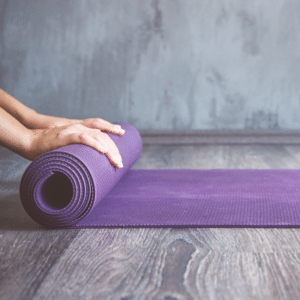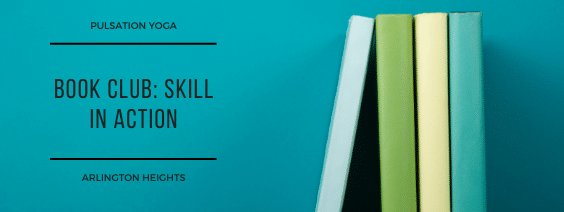 A common “cue” or “phrase” people hear when attending a yoga class is to practice “living yoga off the mat.” (At least I hope this is a sentiment regularly heard when attending a yoga session!) However, how many people that hear this phrase actually stop and wonder what this means?
A common “cue” or “phrase” people hear when attending a yoga class is to practice “living yoga off the mat.” (At least I hope this is a sentiment regularly heard when attending a yoga session!) However, how many people that hear this phrase actually stop and wonder what this means?
Living Yoga “Off the Mat”
When you hear someone say that they practice yoga today what comes to mind? Is it images of people in poses? Someone sitting crossed legged with their eyes closed? An individual laying down in a restful position? None of these images are incorrect, but the awareness that yoga is a lifelong, every minute of the day practice and way of life is sometimes overlooked or forgotten about in Western culture. Instead, it is seen as a compliment to a regular exercise routine, a way to exercise, or just a way to destress. It is, in fact, all of these things and there is nothing wrong with thinking that. However, it is also important to understand that it is connected to so much more.
The thing about yoga is that it is stretching, it is relaxing, it is a philosophy to live life, and it does overlap with all areas of our lives and beliefs. Not every journey is the same, but some students may find that the more immersed they become in the practice, the more it becomes a part of their everyday life – and the more it tends to be practiced off the mat. Yoga becomes a practical skill put into practice to help a person lead a more rounded, peaceful, united, and connected life.
Understanding the Practicality of Yoga
Understanding the practicality of yoga comes from learning from your teachers, reading, attending workshops, and training. By dedicating yourself and your time to the world of yoga, this application becomes accessible. The sometimes rigid ways we may have formed opinions start to become more malleable, perhaps opening our minds to different or newer ways of thinking. Instead of reacting to a different thought process, we may find ourselves pausing and accepting that there is no one right way to think or live or believe.
Each perspective is exactly that: a unique life experience that has nothing to do with another, but at the same time has everything to do with another’s experience. This understanding is merely one gift that yoga has given me. Perhaps it is this gift that has helped me to see and better understand yoga’s connections to religion, social justice, human rights, history, politics, LGBTQ rights, etc. For me, yoga has shifted from exercise to touching all areas of my life, and I no longer see a separation of my yoga practice from any other area of my life.
Sharing in this Discussion
This thought process is what led to the Pulsation Yoga bi-monthly book discussion. Our book discussions have become a great opportunity for any student, regardless of where you are in your practice or mindset, to tie all areas of life to yoga through discussion, exploration, and application of yoga. We take time to explore books that we feel can help facilitate this process. You don’t have to read the books to join the conversation, but we do encourage you to have a basic understanding of the foundational concepts we will be discussing each time.
Our August book discussion is around a short but impactful book entitled, Skill in Action: Radicalizing Your Yoga Practice to Create a Just World, written by Michelle Cassandra Johnson. Johnson began her career as a social worker and now leads “Dismantling Racism” training programs. She is a yoga teacher and leads yoga teacher training sessions centered around social justice.
Her book encapsulates how to practically apply yoga to social justice work by discussing the ancient, traditional principles and ethics of yoga and connecting them to modern day issues. Skill in Action is dedicated to encouraging her readers to apply yoga practices to help make yoga spaces more equitable, diverse, inclusive, and true to the Eastern teachings of yoga.
Putting Skill into Action
Johnson argues that many yoga spaces do not regularly teach students that yoga is a skill to be lived in all areas of our life in order to better ourselves as individuals and help the collective good. She writes, “The practice of yoga teaches us to act skillfully and radically, moving us beyond the borders of our individual minds, hearts, bodies, and spirits’“ (16). She examines the idea that yoga helps us work on ourselves as individuals, hopefully inspiring us to “connect to the heart” and “make social change.” For, “If one is connected with their heart, they have the opportunity to be changed and to shift their perspective” (19).
Embracing a new perspective creates room for change to help create a more just and equitable future for all of society.
The book is divided into three sections:
- What is skill in action
- What skill in action is not
- Build skill in action
Guiding Principles
In her book, Johnson provides practices, breathing exercises, and journaling entries. She explains the current role yoga has in overlapping with racism and issues like spiritual bypassing. Through her words, Johnson demonstrates skill in action by being open and honest, relaying her truth and asking her readers to be receptive to her experience with an open mind and heart.
Just like in the book, I hope during the studio discussion that participants feel comfortable to share their truths, but also to be open to the possibility to shift their perspective when needed. The goal with any book discussion is to work as a group to understand the book’s ideas and process, and work through the parts around which we struggle to wrap our minds. This discussion will dive into subjects like white supremacy, spiritual bypassing, best practices of yoga to avoid appropriation, and ways to build a stronger, more inclusive, diverse yogic community.
If you are interested in these topics and would like to participate in the discussion please sign up here. The discussion is free, however, we do ask that you consider a donation (any amount is wonderful) to the local charity called YogaCare.
How You Can Put Your Skills into Action
A huge part of yoga practice is the skill of listening: listening to our body, listening to others speak, and listening to the world around us. This discussion will help us hear others’ perspectives, stories, and needs from yoga. Between now and the discussion (and during the discussion), I ask that participants try to notice how many times you feel the need to insert your own experience, your own story, and your own opinion. What important information are we missing by not being more present and fully attentive to what others are saying? Perhaps, with this practice of making space to listen, we can start to hear and see how many places in our lives yoga touches.
Yoga is a skill and way to guide us in all areas of our lives. If we don’t practice listening or becoming more aware, we are not being mindful enough to truly appreciate the journey along the way.
I hope that many will read this and feel inspired to participate in this discussion to help connect to yoga in a deeper way, help apply the principles and ethics in a practical way, and to see how yoga can touch upon all moments of your life. Lastly, I hope that by practicing yoga for many years and in all forms, you will see that by living a yogic life we can start to create radical, positive change for the betterment of all beings.
Cassandra Johnson, Michelle. Skill in Action. Shambhala Publications, Inc. 2020.

